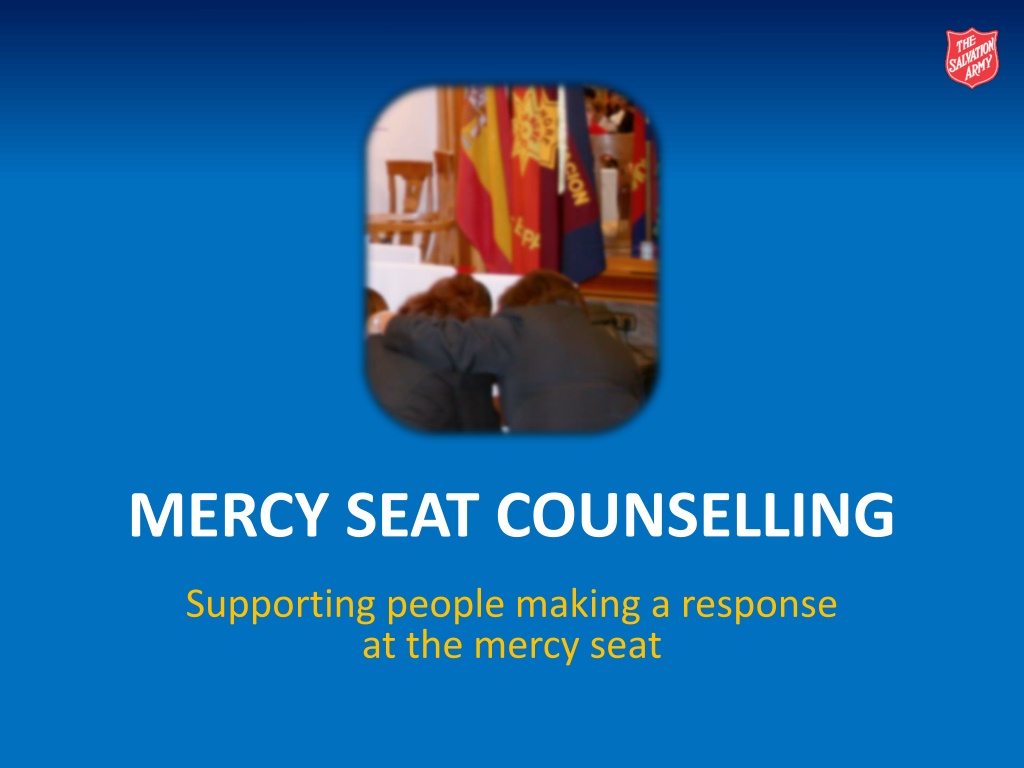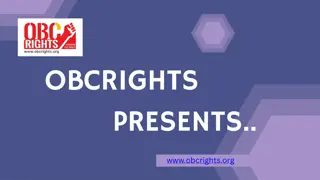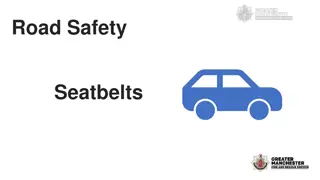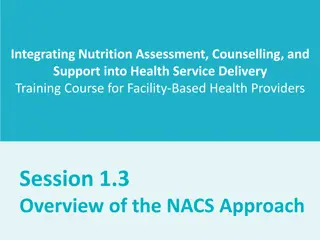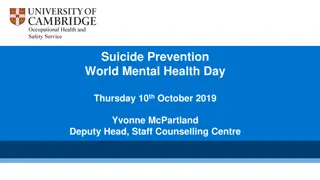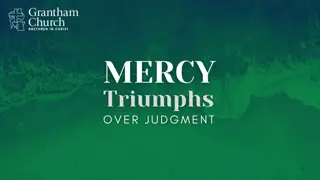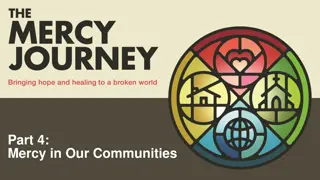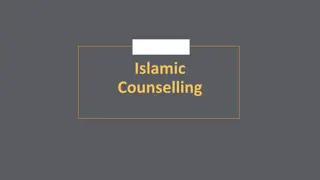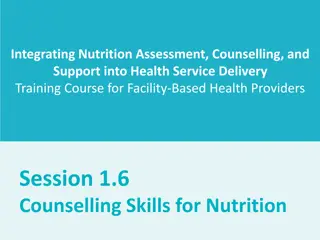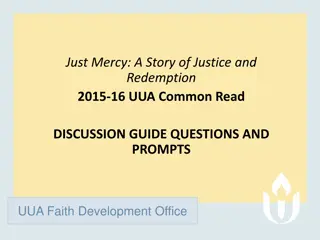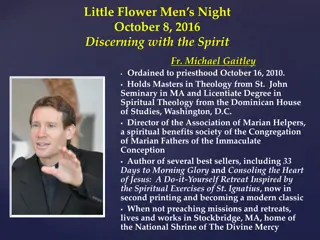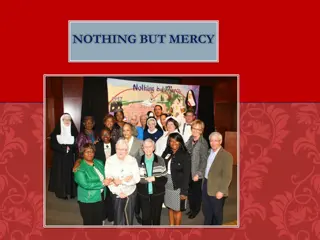Mercy Seat Counselling Course Overview & Discussion
Dive into the world of mercy seat counselling through a comprehensive course that equips you to support individuals seeking God. Explore the significance of the mercy seat, counselling processes, signs, wonders, and more. Engage in discussions about the benefits, barriers, and qualities of a mercy seat counsellor. Join this course to learn, grow, and make a difference in people's spiritual journey.
Uploaded on Sep 25, 2024 | 0 Views
Download Presentation

Please find below an Image/Link to download the presentation.
The content on the website is provided AS IS for your information and personal use only. It may not be sold, licensed, or shared on other websites without obtaining consent from the author. Download presentation by click this link. If you encounter any issues during the download, it is possible that the publisher has removed the file from their server.
E N D
Presentation Transcript
MERCY SEAT COUNSELLING Supporting people making a response at the mercy seat
COURSE PURPOSE There is no greater privilege than helping someone who is seeking God. The goal of this course is to prepare you so that you are equipped and confident to help them well.
COURSE OVERVIEW 1. Why a mercy seat? 2. Counselling process 3. What else? 4. Signs & wonders 5. Local variations
DISCUSSION Please introduce yourself and share: a) Your experience (if any) in mercy seat counselling b) What has led you to doing this course c) What you are hoping to learn
1. WHY A MERCY SEAT? The mercy seat is the place at the front of most Salvation Army chapels to pray at Traditionally, people knelt but it is now common to stand From an early age, William Booth was convinced of the benefit of calling people to public decision The mercy seat is a Biblical concept it is the name for the lid of the Ark of the Covenant where God met with Moses (1 Chronicles 28:11) (some translations use place of atonement)
DISCUSSION 1. What are the benefits of having a place for people to come forward to and pray? 2. What barriers exist to mercy seat use and how can these be overcome? 3. What is the difference in emphasis between the terms mercy seat and penitent form? 4. What is the difference between the mercy seat and the holiness table?
DISCUSSION THE ROLE OF THE MERCY SEAT COUNSELLOR What qualities do you think a mercy seat counsellor needs? Rate these qualities as essential, useful or largely irrelevant: FAITH IN GOD ABILITY TO RELATE WELL TO OTHERS GOOD PERSONAL HYGIENE EMPATHY THEOLOGY DEGREE CONFIDENTIALITY KNOWING THE INDIVIDUAL KNOWLEDGE OF THE BIBLE SENSITIVITY TO THE HOLY SPIRIT OFFICER TRAINING AVAILABILITY FOR FOLLOW UP TACT COUNSELLING QUALIFICATION GOOD HEARING
SUMMARY The mercy seat is a place where people can come to pray Public responses tend to be more lasting than private ones provide an event that can be remembered provide opportunity for support and counsel The main requirements for being a mercy seat counsellor are: A vibrant faith A genuine desire to help the other person We are not professional counsellors. Our only authority comes from the Bible
COUNSELLING PROCESS We will look at the counselling process as three key steps: BEFORE DURING AFTER 1. Before you approach the seeker 2. During (your discussion) 3. After (follow up)
BEFORE DISCUSSION When people come forward to the mercy seat, who counsels who? How do you decide?
BEFORE BEFORE APPROACHING A SEEKER Before approaching a seeker: 1. Pray rely on God, not yourself 2. Decide who is best to counsel ideally: Same gender Existing relationships (e.g. small group leader, someone who has counselled them in the past) Children and youth leaders counsel young people More experienced if seeker is known to struggle with more severe emotional issues BEFORE Pray Who?
DURING DISCUSSION What are the different reasons people come forward for prayer? Do different reasons require different counselling approaches? Are there some things that are common?
DURING PROCESS FOR DURING The main reasons people come forward: a) Salvation: first time seeker b) Holiness: total commitment and surrender c) Restoration: renewing a right relationship with God (e.g. if you have backslidden or sinned) d) Petition: for example, facing a difficult situation Each reason requires a different focus of questions You will start and close the same way DURING START COUNSEL CLOSE
DURING START PHASE You only have one chance to make a first impression Objective of the start phase: Introduce yourself Check that the person wants someone (and you) to pray with them Find out what support (if any) they would like Follow four steps START Pray Introductions Permission Ask & listen
DURING PRACTICE In pairs, assign one person to be the seeker and the other the counsellor. START Pray Introductions Permission Ask & listen Without telling the counsellor, the seeker thinks up a scenario (e.g. first time seeker, issue at work, committed crime, etc.) and whether or not they want someone to pray with them. The counsellor comes to talk, following the suggested steps. Debrief; then swap over.
DURING COUNSEL Once you understand what the person is seeking, you can provide relevant support Refer to pages 10-11 and the quick reference guide COUNSEL SALVATION God s love (John 3:16) Salvation Confession / repentance Holiness Prayer HOLINESS Becoming holy (1 Thes 5:23-24) Set apart (Rom 12:1-2) God s power (Eph 3:14-21) Holy Spirit (John 16:13) Confession & surrender RESTORATION Reassurance Confession God s pardon (1 John 1:9) Prevent backsliding Armour of God (Eph 6:13) PETITION Present to God (Phil 4:6) Accept his peace Trials (James 1:2-3) Wisdom (James 1:5-8) Fast (Ezra 8:23)
DURING PRACTICE In pairs, practice these scenarios: 1. Someone coming to pray for salvation 2. A teenager who is trying to live for Jesus, but really wants to take their faith to a new level 3. Someone who has been involved with pornography 4. Someone who is struggling with depression and is sick of it. In the interest of time, assume that the seeker has already agreed for you to pray with them. Debrief; then swap over. COUNSEL
DURING COUNSELLING CHILDREN AND TEENS Similar process to adults If you don t get on with kids, find someone else Keep things simple and literal Pass on difficult situations to those trained professionally to deal with them
DURING CLOSE Pray: invite the seeker to pray first (silently if necessary), then pray yourself Move?: to another room if the seeker needs more support or you are holding up the congregation Restitution: does the seeker need to put anything right? Spiritual disciplines: personal prayer and Bible reading are essential to dynamic discipleship Contact details: for follow up CLOSE Pray Move? Restitution Spiritual disciplines Contact details
AFTER FOLLOW UP Your counselling should not finish at the mercy seat You still need to: 1. Follow up (to see how they are) 2. Ensure that they have in place support mechanism
AFTER DISCUSSION Why is it important to follow up with all seekers? If you were the seeker, when would you want to be contacted? Can you be too soon or too late? What does a seeker need to help them grow as a disciple of Jesus? How can you help with this?
SUMMARY BEFORE START COUNSEL CLOSE FOLLOW UP Pray Who? Pray Introductions Permission Ask & listen Pray Move? Restitution Spiritual disciplines Contact details Make contact DISCIPLING Mentor Small group Spiritual disciplines Worship service SALVATION God s love (John 3:16) Salvation Confession / repentance Holiness Prayer HOLINESS Becoming holy (1 Thes 5:23-24) Set apart (Rom 12:1-2) God s power (Eph 3:14-21) Holy Spirit (John 16:13) Confession & surrender RESTORATION Reassurance Confession God s pardon (1 John 1:9) Prevent backsliding Armour of God (Eph 6:13) PETITION Present to God (Phil 4:6) Accept his peace Trials (James 1:2-3) Wisdom (James 1:5-8) Fast (Ezra 8:23) God s Word is your authority
3. WHAT ELSE? 1. No distractions (or attractions) 2. We cannot fix their problems 3. Confidentiality 4. Avoid clich s and Christian-ese 5. Listen 6. Follow through 7. Do not try to force communication or answers
SUMMARY Your time at the altar is to help the seeker meet with God. Ask questions, listen intently and offer advice sparingly Take your authority from the Bible.
4. SIGNS AND WONDERS In the New Testament, the proclamation of the gospel almost always went hand in hand with a demonstration of the Holy Spirit s power Paul says these gifts will only cease when Jesus returns and they are no longer required (1 Corinthians 13:10)
DISCUSSION What experiences do people have of the supernatural display of the Holy Spirit and do you think such experiences are helpful? Do you think we should expect to see the supernatural display of the Holy Spirit as part of God s kingdom activity today? What do you see as the point of any supernatural signs and wonders?
THE ACTS VIEW The filling of the Holy Spirit was a regular experience, to: Give boldness Give the ability to perform signs and wonders that would point people to Jesus. For example: You will receive power when the Holy Spirit comes on you (Acts 1:8). Peter was filled with the Spirit (again) to preach with boldness (Acts 4:8) All the disciples (including Peter) prayed (again) for boldness and for signs and wonders to point people towards Jesus (Acts 4:29-31)
DISCUSSION Does this Acts view of signs and wonders differ from your personal experiences?
PRAYING FOR PEOPLE TO RECEIVE THE HOLY SPIRIT In response to a specific call, not prayer for healing or deliverance Laying on of hands Pray out loud in context of appeal, or using a Bible verse A range of experiences are common As a general rule, we discourage the public speaking in tongues
5. LOCAL VARIATIONS 1. Approach 2. Commitment 3. Pre- or post-service meetings and prayer 4. Resources 5. Room for further counselling 6. Follow up
SUMMARY Public responses tend to be more lasting than private ones provide an event that can be remembered provide opportunity for support and counsel The main requirements for being a mercy seat counsellor are: A vibrant faith A genuine desire to help the other person We are not professional counsellors. Our only authority comes from the Bible
SUMMARY (CONTINUED) Your time at the altar is to help the seeker meet with God. Ask questions, listen intently and offer advice sparingly The before and after steps are just as important as your time talking with the seeker
SUMMARY (CONTINUED) BEFORE START COUNSEL CLOSE FOLLOW UP Pray Who? Pray Introductions Permission Ask & listen Pray Move? Restitution Spiritual disciplines Contact details Make contact DISCIPLING Mentor Small group Spiritual disciplines Worship service SALVATION God s love (John 3:16) Salvation Confession / repentance Holiness Prayer HOLINESS Becoming holy (1 Thes 5:23-24) Set apart (Rom 12:1-2) God s power (Eph 3:14-21) Holy Spirit (John 16:13) Confession & surrender RESTORATION Reassurance Confession God s pardon (1 John 1:9) Prevent backsliding Armour of God (Eph 6:13) PETITION Present to God (Phil 4:6) Accept his peace Trials (James 1:2-3) Wisdom (James 1:5-8) Fast (Ezra 8:23) God s Word is your authority
SUMMARY (CONTINUED) Watch your personal grooming We cannot fix their problems Do not force confessions Follow through on any promises
APPENDICES Your course book contains some helpful information in the appendices: 1. Some tips for personalising God s promises 2. Helpful scripture references 3. A few different approaches to sharing the gospel message 4. Coping with objections Some of these are also in your quick reference guide
FINAL WORD Remember: there is no greater privilege than helping someone who is seeking God.
MERCY SEAT COUNSELLING Supporting people making a response at the mercy seat
